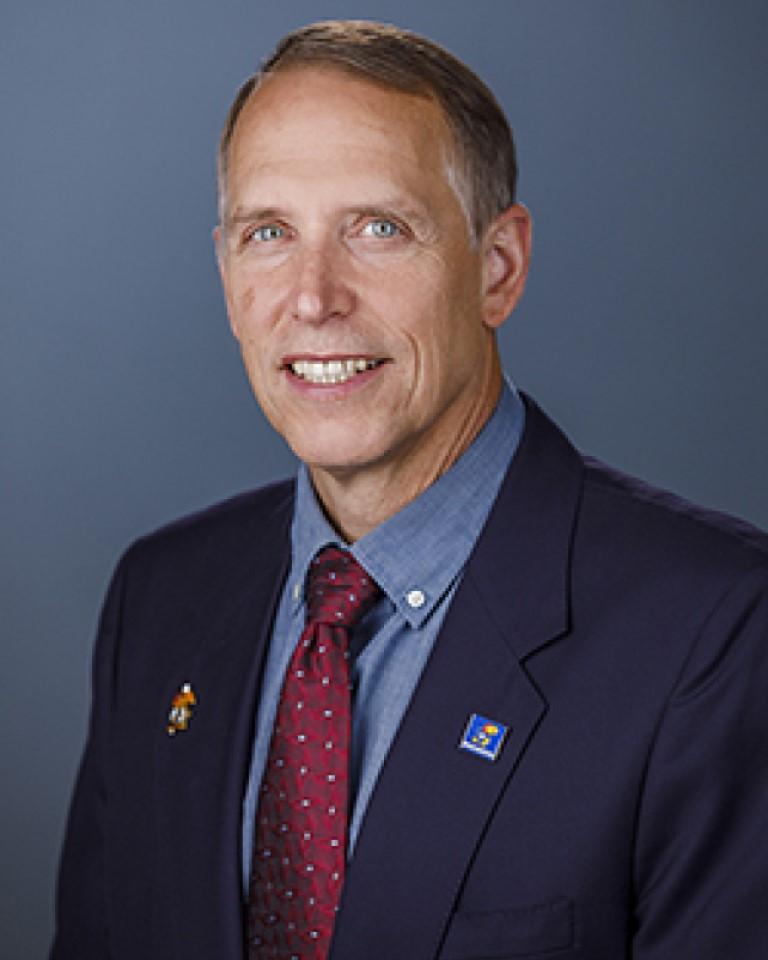Ken Fischer

MENTOR SPOTLIGHT | FEBRUARY 2021
Department: Mechanical Engineering and Bioengineering
Describe your research/creative scholarship in a few sentences that we can all understand: My research focuses on bones and joints and preventing and treating diseases. Our current work has two thrusts. One area focuses on a novel treatment for bone cysts using a screw to mechanically stimulate healing in persistent cysts. The other area focuses on the design features of micropipettes and how the features influence the forces required to use the micropipettes. We hope to provide data-driven guidance on ergonomic micropipette design.
Q: How did you first get interested in doing research or creative work?
A: My undergraduate capstone design project actually included a lot of research, including data collection, analysis and reporting. After working in industry for four years, I really got excited about research when I discovered the emerging field of biomedical engineering. Some 30 years ago, I was intrigued by the amazing properties and adaptability of bone, and I’ve been studying musculoskeletal injuries, diseases, and their treatments ever since.
Q: What do students in your discipline learn by doing research that they wouldn’t learn by just taking classes?
A: Experiences obviously vary, but research usually includes the opportunity to work with state of the art equipment and sometimes to develop and test new devices. When you help make a new discovery, there is a strong sense of achievement. Also, participating in writing abstracts and presenting research at a conference, with opportunities to see other cutting edge research as well as networking with other researchers, is an invaluable experience. While students would use some of what I teach in my biomechanics classes, they learn to go beyond and dig deeper. They also learn that if you want to stay up to date, you can’t stop learning. They also learn that things don’t always go right the first time in research, and sometimes there are no right answers.
Q: What do you find to be the most exciting part of doing research or creative work? What makes this line of work meaningful and interesting to you?
A:I think most biomedical engineers really want to make a positive impact on healthcare, and that motivates us. However, it doesn’t take long to realize that basic research is a long way from clinical practice. Even so, the most exciting part is helping to improve understanding of disease and to move potential treatments and technologies along the path to clinical use. Much of my research is to help understand why a treatment works, so that then we can help make it even more effective.
Q: What advice do you have for undergraduates interested in doing research in your field?
A: I personally recommend that freshmen spend their first semester making sure they can succeed in classes and evaluating how much time they can give to an extra-curricular activity like research. Then find something that you are passionate about and seek out faculty doing work in that area. And if there is coursework that will support the research, take those courses when you can, to become an even better research assistant.
Q: For many students, doing research or a larger creative project is the first time they have done work that routinely involves setbacks and the need to troubleshoot problems. Can you tell us about a time that your research didn’t go as expected? Or about any tricks or habits that you’ve developed to help you stay resilient in the face of obstacles?
A: It’s true that not all research works out the way you hope/expect. I recall one project studying the structure of various cat skulls and trying to understand the relationship between the eye opening and the occular nerve. At first we thought we had found a cool new principle conserved across all types of cats, but then realized there was a fundamental misconception. You need to realize that everyone makes mistakes. Don’t take yourself too seriously, and it will help you move beyond failures in research and any area of life.
Q: How do you spend your time outside of work?
A: I spend much of my outside time keeping our family fleet of cars running, and fixing everything that breaks around the house. But I try to spend the bulk of my time enjoying our lake home and spending time in/on the water with family and friends.